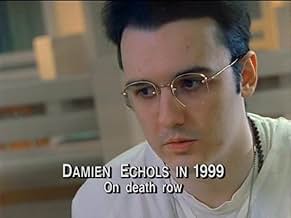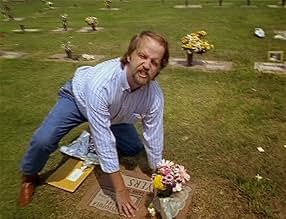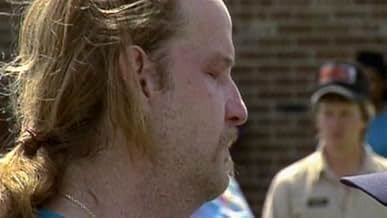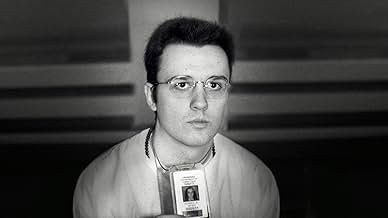América Nua e Crua: Paraíso Perdido 2
Título original: Paradise Lost 2: Revelations
AVALIAÇÃO DA IMDb
7,5/10
10 mil
SUA AVALIAÇÃO
Adicionar um enredo no seu idiomaThe case of the West Memphis Three, its questionable circumstances and the parties involved are followed up years later.The case of the West Memphis Three, its questionable circumstances and the parties involved are followed up years later.The case of the West Memphis Three, its questionable circumstances and the parties involved are followed up years later.
- Indicado para 1 Primetime Emmy
- 2 vitórias e 1 indicação no total
Melissa Byers
- Self
- (cenas de arquivo)
Tim Sullivan
- Self
- (sonoplastia)
Jessie Misskelley
- Self
- (as Jessie Miskelly)
Avaliações em destaque
After the storm kicked up by the first film, film-makers Joe Berlinger and Bruce Sinofsky returned to West Memphis four years later. Whereas the first film seemed to simply document the case in as much detail as possible and allowed you to make your own mind up, with Revelations, they seem to have their own agenda. New 'evidence' has been discovered, and perhaps the real killer still walks the streets, and it's clear who Berlinger and Sinofsky believes it to be. That crazy bastard John Mark Byers, who took so much pleasure in giving Biblical rants to camera, hardly covers himself in glory, and he's back here to build fake graves for Damien Echols, Jason Baldwin and Jessie Misskelley at the crime scene, only to set them on fire amidst his demented monologues.
It's sad that Berlinger and Sinofsky decided to take such a manipulative approach to the sequel, as although Byers is clearly an unhinged and simple-minded hick, there is no evidence against him killing the three boys (Michael Moore, Stevie Branch, and his stepson Christopher Byers) aside from the fact that he comes across as scary and strange. The first film was an intense study of mob mentality and the dangers of pre- judgement by appearance, and how the West Memphis Three managed to get themselves convicted simply for being black-wearing outcasts. So Revelations comes across is hypocritical.
When new evidence is presented, suggesting teeth marks on the head of one of the victims, tests prove that none of the WM3's teeth match. When Byers is confronted, he reveals that he had his teeth removed but keeps changing his story as to when this took place. He is repeatedly confronted by a support group that help fund and promote the case against the WM3, but they come across as equally strange as Byers, following Echols like groupies as if he was some kind of prophet, and they berate Byers into handing in his dental records voluntarily to prove himself innocent. Byers refuses, stating that there is no case against him, and this is shown in the film as if an admittance of guilt. The film-makers never take any time to explain the reasoning behind Byers' behaviour, clearly convinced of his guilt.
In the end, it's a case of there being too little here to warrant a two hour-plus movie. The new evidence is flimsy to say the least, and as revealed in West of Memphis (2012), is probably completely wrong. Yet when the film gets back down to cold facts, it becomes as riveting as the first film, unveiling a justice system that seems unwilling to open the doors to the possibility that they simply got it wrong. It's just a shame that too much time is spent on a personal witch-hunt, and even when Byers passes a voluntary lie-detector test, the film suggests that Byers was on so much prescription medication that the results of this cannot really stand up, yet fails to ask to conductor of the test of his views regarding this. It's certainly a confused film, and one that works best when it stays on topic and documents the facts rather than revelling in propagandistic speculation.
www.the-wrath-of-blog.blogspot.com
It's sad that Berlinger and Sinofsky decided to take such a manipulative approach to the sequel, as although Byers is clearly an unhinged and simple-minded hick, there is no evidence against him killing the three boys (Michael Moore, Stevie Branch, and his stepson Christopher Byers) aside from the fact that he comes across as scary and strange. The first film was an intense study of mob mentality and the dangers of pre- judgement by appearance, and how the West Memphis Three managed to get themselves convicted simply for being black-wearing outcasts. So Revelations comes across is hypocritical.
When new evidence is presented, suggesting teeth marks on the head of one of the victims, tests prove that none of the WM3's teeth match. When Byers is confronted, he reveals that he had his teeth removed but keeps changing his story as to when this took place. He is repeatedly confronted by a support group that help fund and promote the case against the WM3, but they come across as equally strange as Byers, following Echols like groupies as if he was some kind of prophet, and they berate Byers into handing in his dental records voluntarily to prove himself innocent. Byers refuses, stating that there is no case against him, and this is shown in the film as if an admittance of guilt. The film-makers never take any time to explain the reasoning behind Byers' behaviour, clearly convinced of his guilt.
In the end, it's a case of there being too little here to warrant a two hour-plus movie. The new evidence is flimsy to say the least, and as revealed in West of Memphis (2012), is probably completely wrong. Yet when the film gets back down to cold facts, it becomes as riveting as the first film, unveiling a justice system that seems unwilling to open the doors to the possibility that they simply got it wrong. It's just a shame that too much time is spent on a personal witch-hunt, and even when Byers passes a voluntary lie-detector test, the film suggests that Byers was on so much prescription medication that the results of this cannot really stand up, yet fails to ask to conductor of the test of his views regarding this. It's certainly a confused film, and one that works best when it stays on topic and documents the facts rather than revelling in propagandistic speculation.
www.the-wrath-of-blog.blogspot.com
Generally riveting follow up of the case where three quite possibly innocent young men sit in prison for murdering three children.
Certainly, at least given what the two documentaries show, there is way beyond 'reasonable doubt' that they're responsible. But what was a moderate flaw in the first film becomes worse here; In the same way the prosecution disturbingly made the evidence fit their theory, throwing out, ignoring, or belittling what didn't fit, the film-makers seem to play some of the same game in reverse.
Crucial questions about alibis are never answered, and this sequel spends too much energy trying to pin guilt on Mark Byers, step-father of one of the murdered boys.
Is there some spooky circumstantial evidence that he may have been involved? Absolutely. But proof? The man even voluntarily takes a lie detector test, and passes with flying colors, which the film- makers then dismiss since the man is on various prescription mood altering drugs. But do we ever hear an expert say those drugs might affect the test? No.
More disturbing, the film seems to imply he's guilty because he looks and acts weird, and says confusing and contradictory things, the very sort of 'guilt by odd behavior' association both films attack in relation to the three boys found guilty. The fact that Byers (supposedly) has a brain tumor, and what effect that might have on his outward behavior is never explored at all. And watching this character at such length starts to get dull after a while, as his rants go on and on.
None-the-less, this is still a very interesting film, the most moving sections being those spent with the three now young men in jail for a crime they likely didn't commit. All have grown up a great deal in the 4 years since the last film, and are sad and articulate reminders of how horrifying it can be that people never given the benefit of a fair trial are allowed to sit and rot in prison. And the amazing lack of despair or bitterness they show is a testament to human resilience.
Certainly, at least given what the two documentaries show, there is way beyond 'reasonable doubt' that they're responsible. But what was a moderate flaw in the first film becomes worse here; In the same way the prosecution disturbingly made the evidence fit their theory, throwing out, ignoring, or belittling what didn't fit, the film-makers seem to play some of the same game in reverse.
Crucial questions about alibis are never answered, and this sequel spends too much energy trying to pin guilt on Mark Byers, step-father of one of the murdered boys.
Is there some spooky circumstantial evidence that he may have been involved? Absolutely. But proof? The man even voluntarily takes a lie detector test, and passes with flying colors, which the film- makers then dismiss since the man is on various prescription mood altering drugs. But do we ever hear an expert say those drugs might affect the test? No.
More disturbing, the film seems to imply he's guilty because he looks and acts weird, and says confusing and contradictory things, the very sort of 'guilt by odd behavior' association both films attack in relation to the three boys found guilty. The fact that Byers (supposedly) has a brain tumor, and what effect that might have on his outward behavior is never explored at all. And watching this character at such length starts to get dull after a while, as his rants go on and on.
None-the-less, this is still a very interesting film, the most moving sections being those spent with the three now young men in jail for a crime they likely didn't commit. All have grown up a great deal in the 4 years since the last film, and are sad and articulate reminders of how horrifying it can be that people never given the benefit of a fair trial are allowed to sit and rot in prison. And the amazing lack of despair or bitterness they show is a testament to human resilience.
I saw this movie just over a week ago and after watching it I didn't sleep. I HAD to find out more so I visited the website for more, obviously biased, information. I can't believe that three young men can be locked up for murder (2 for life and one on death row) for this crime. Anyway, about the film. I found the crime photos pretty disgusting but I thought they were presented well, no full screen close up shots but you could see all you wanted to none the less while also being able to avert your eyes a little. I haven't viewed the first film by HBO so I can't compare the two but this one seems to present more, new evidence. I think the bite marks are the most promising pieces of evidence. If it wasn't one of the men in jail who bit the boy(s), who did? Was there a fourth person or was there a different killer(s) altogether? I have no doubt in my mind that the powers that be have to get x-rays of Mark Byers teeth before he had them surgically removed in 1997 and compare them with the bite marks.
Sorry, I keep wandering into the case and off the topic of the film. Watch this film! Prepare to be upset. Prepare to be outraged. Watch it with an open mind and I think you'll fail to find words to describe how a legal abomination such as this can happen in this day and age. I don't expect a 3rd film but I am following the case very closely for sure.
Sorry, I keep wandering into the case and off the topic of the film. Watch this film! Prepare to be upset. Prepare to be outraged. Watch it with an open mind and I think you'll fail to find words to describe how a legal abomination such as this can happen in this day and age. I don't expect a 3rd film but I am following the case very closely for sure.
But not for the right reasons.
The snickering, smug arrogance of the filmmakers, who seem to have more screen time than anyone actually involved in the case, made me see this documentary as just a vanity project. I couldnt even buy the patronizing solicitude they showed towards one defendant (undoubtedly because he is the most photogenic of the three convicted of the crime).
There is a definite travesty of justice here, but getting to the truth seems to have become secondary to the childish delight with which the filmmakers show how much smarter they are than anyone else.
Their hearts may indeed be in the right place, and they truly want to see justice served, but this kind of flagrant self-aggrandizment does not do justice to anyone.
The film offers no real evidence as to the identity of the "real" killer, beyond the filmmakers' own speculation and innuendo - which is precisely what convicted the three boys they are trying to "save" in the first place.
The snickering, smug arrogance of the filmmakers, who seem to have more screen time than anyone actually involved in the case, made me see this documentary as just a vanity project. I couldnt even buy the patronizing solicitude they showed towards one defendant (undoubtedly because he is the most photogenic of the three convicted of the crime).
There is a definite travesty of justice here, but getting to the truth seems to have become secondary to the childish delight with which the filmmakers show how much smarter they are than anyone else.
Their hearts may indeed be in the right place, and they truly want to see justice served, but this kind of flagrant self-aggrandizment does not do justice to anyone.
The film offers no real evidence as to the identity of the "real" killer, beyond the filmmakers' own speculation and innuendo - which is precisely what convicted the three boys they are trying to "save" in the first place.
There are a couple of ignorant comments that I wanted to address from other posters here. Firstly, The individual who stated that the filmmakers spent the most time on screen was totally wrong, as the filmmakers NEVER appeared on camera. I think this person was referring to the group that was dedicated to freeing the "West Memphis Three." These were just more characters in the story, not the filmmakers. Also, another person pointed out that the polygraph test as if it were indisputable proof that the step-father had not done this crime. I don't agree. 1.He was taking alot of drugs, not to mention he was obviously mentally challenged. 2. right before he took the test, he was obviously lying about a great deal of things (he said he never had trouble with the law, he said he did not know how his wife died, and in the very next sentence referred to the "murder" of his wife, etc.)3. he had spent a great deal of time convincing everyone and himself that he had not done it, that he may just have believed it. Now, He may or may not have been responsible, I am not going to try and convince anyone, but at least pay attention when making your decisions. It just doesn't make sense to me that those boys did this when you look at the evidence. The first film did a better job of presenting the case than this one, but part two is a great continuation of the case. It would have been pointless to cover too much old ground. So if you are able to find part one anywhere, or it comes on HBO again, watch it if you have not.
Você sabia?
- CuriosidadesThe only film of the trilogy to be a TV project instead of receive a theatrical release.
- Erros de gravaçãoAt one point the on-screen date for a trial scene is listed as January of 1993. The murders didn't occur until May of that year.
- Trilhas sonorasWelcome Home (Sanitarium)
Performed by Metallica
Written by James Hetfield, Lars Ulrich, and Kirk Hammett
Produced by Flemming Rasmussen with Metallica
Principais escolhas
Faça login para avaliar e ver a lista de recomendações personalizadas
Detalhes
- Data de lançamento
- País de origem
- Idioma
- Também conhecido como
- Paradise Lost 2: Revelations
- Locações de filme
- Empresas de produção
- Consulte mais créditos da empresa na IMDbPro
- Tempo de duração2 horas 10 minutos
- Cor
Contribua para esta página
Sugerir uma alteração ou adicionar conteúdo ausente

Principal brecha
By what name was América Nua e Crua: Paraíso Perdido 2 (2000) officially released in Canada in English?
Responda























